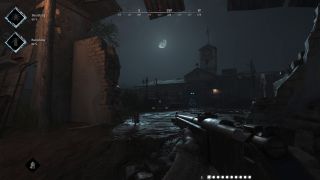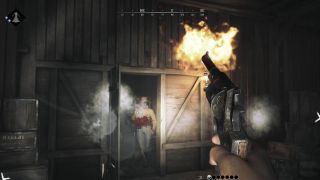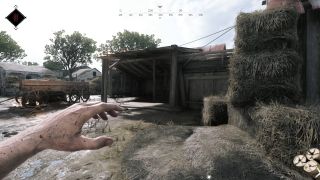Here's why you should be playing Hunt: Showdown in 2021
I let this game fly under the radar for too long, and so have many of you.

Can you take a guess at the videogame I've been sinking hours of my time into over the past few weeks? Hunt: Showdown has consumed my evenings, occasional lunch times, and a generous helping of my weekends, too. A friend of mine bought me the game for Christmas, with a plea much like the one I'm making to you now, and I've sunk over 100 hours into it since.
Hunt Showdown has grabbed my attention and slapped me across the face with it, and I have a hunch it'll have the same effect on at least a few of you.
Initially released in early access back in 2018, developers Crytek subsequently finalised the game for launch in August 2019. So I'm late to the party on this one. The game's seen a small surge in players recently, though, managing to take a swing at its highest average player counts ever over the past two months.
Things are looking up for Hunt: Showdown, but the reason I want to talk about it isn't just a plea for more players, it's simply because I think it's a game with a whole lot of potential, both casually and competitively, that feels under-tapped so far.
But before I get ahead of myself—if Hunt: Showdown flew under your radar like it did mine, you might want to know the basics. Essentially, it's a PvEvP first-person shooter based loosely on a Zombie-infested version of late 19th century Louisiana. There are a few game modes, but the central focus is one called Bounty Hunt. For that, you'll be dropped into a map as a hunter with a loadout of weapons and items of your choosing. From your spawn location you'll have to search highlighted locations for clues in order to locate your target—one of three big bad monsters. Simply kill said target, banish the remains, and extract with the bounty token it leaves behind to win.
Hunt: Showdown is a champion of positional 3D audio.
A couple of important notes to consider: as you go about your hunting so too are a handful of enemy teams or solo players (up to 12 players can enter a match in total). And there aren't enough bounty tokens to go around. So don't let your guard down. And I'm sure I mentioned the twisted menagerie of zombies, monsters, and women that scream bees at you, no?
That's the basic premise, anyways. As you'll discover, there's far more to surviving in Hunt: Showdown, let alone walking out with a bounty token.
The biggest gaming news, reviews and hardware deals
Keep up to date with the most important stories and the best deals, as picked by the PC Gamer team.
The game's audio is impeccable
There are only a handful of games that truly nail sound design like Hunt: Showdown. Audio cues are clear, distinct, and play a pivotal role in both the PVP and PVE gameplay, and are often of more importance than sight all the way up until the moment you pull the trigger on someone's exposed noggin.
Hunt: Showdown offers two maps of equal size, and they're pretty generously sized, too. Each one a square grid of almost equidistant locations: the focal point of the game's action for the most part. The trick to Hunt's sound design is that you could very well hear a gunshot from just about the other side of the map, if the gun in use is loud enough or the explosion big enough—which they often are.

So you have to play your game close to the ground and wary of crows, hens, dogs, zombos, and awful things called Immolators. You'll find yourself both tearing cross-country or moving at snail's pace between obstacles: living, undead, mechanical, or literally just sticks on the ground, which make one hell of a racket under clumsy feet. The sounds you make as you go, or lack thereof, will act as fair signal to fellow players and enemies of your approach or a smokescreen that can cover your movements to deadly effect.
It goes both ways, of course. Just as an enemy might hear you approach full-bore to their location, you'll hear distant gunshots or the belated grunt of a player slicing a zombie just a few metres way. You can discern weapons, number of players on a team, where they're headed, and even the whereabouts of the bounty—that which you need to discover, defeat, and escape with to consider yourself a winner—all from the games' detailed sounds and directional audio courtesy of binaural processing.
Hunt: Showdown is a champion of positional 3D audio, and a prime example of how well-designed audio can be a game mechanic unto itself. It's your fundamental gauge of the threat posed to your hunter at any given time.
Hunt: Showdown lives up to its name
Which brings me onto my next point: tracking. Not only is it possible to track hunters through the bayou, you can do so with a degree of effectiveness and skill that will actually lead you to something fruitful. Or death.
It's something you learn as you play the game: how to understand your opponent's likely behaviours, where they'll move next, where they might be out in the open. You learn to back off for a moment in the hopes of catching someone unawares and unleashing head-popping hell from a nearby woodland or derelict house.
As the game progresses, certain events will unfold to give you a heads-up on an enemy location, or keep you from making an easy escape. The game's balanced in such a way that, in order to win, you must expose yourself to all alive still in the map.

If you're not in the possession of the bounty by the match endgame, you might choose to head off a likely route for the bounty possessor and take it from them with deadly force. Sure you might feel a tinge of guilt if it pays off, but there's everything to gain.
If you're the one trying to get that bounty away to an extraction point, it's a matter of preparing yourself for a fight or trying to slip out quick in the hope of a less bullet-prone exit.
Justice is swift and punitive
With a one-headshot-and-you're-dead approach to gunplay, there's very little room for error in matches. You're either left standing or dead in a ditch within a couple of minutes. Most often a couple of seconds—such can be the cruel ways of Hunt: Showdown.
Most of all you're rewarded for positioning. Get a solid angle on someone and you've basically got them dead-to-rights and one mouse click from the mission summary menu. Get flanked on from the side and caught unawares yourself, and it'll be you catching a bullet and praying for a sketchy respawn.
Or loading up another hunter with a pricey payload of late 19th century war memorabilia.
If the game's antiquated choice of weaponry and humble HUD offer a concept of safety at distance, you'd be mistaken. That ancient armoury is far more deadly at range than you'd first suspect. A clear day and a decent scope might pop you from a fair distance.
There's a deep stratagem to it what might otherwise be a storm of bullets in any other era. A single shot rifle with a reload time upwards of 10 seconds doesn't leave much room for spray and pray, and accuracy is paid in kind.
It's that kind of strict 'one mistake and you're out' gameplay that keeps you on your toes and forever reeling over the idiotic decisions that lead to untimely death.
Constant on-the-fly decisions change the pace of the game entirely and can turn the tide in that fight. Rushing in on a single downed opponent can be risky, but is often highly rewarding if you've more alive and kicking on your team than they. There's also the long game: sitting and waiting for an opponent to get desperate, which is especially useful once a body of a downed cohort has been set on fire (which accelerates the timer until perma-death sets in). It's not often pretty, and exposes yourself to a push from another team in a more exposed position, but it can see you through an encounter if you're more of a risk-averse player.
Sure, you'll think you're safe
No matter how you play there's no letting your guard down in Hunt. Especially in duos. That's where you'll often find opponent hunters play things quiet and safe—too quiet, if you ask me. If you're not the first to a bounty, you'll often be met with a fierce defence of a location, and that sort of stalemate is known to continue for quite some time.
Top tip for newbies: you can also choose to play against teams of three even as a two-person party, and I recommend you try it out for a more aggressive playstyle all round—if you think you're 'ard enough.

So prevalent is the calm and quiet tactic in Hunt: Showdown that you might think every player on the server has been wiped bar you, and confidently rush an extraction point with all guns blazing. In those moments, overconfidence could easily be your downfall. You're left wide open for an enemy team to come streaming out the bushes and blast a bullet or two through your hopes and dreams.
There's something about the constant rethinking of tactics and outcomes and possible plays that keeps you on your toes in just about every match of Hunt: Showdown. I say 'just about' because I've definitely played at least one match where a friend and I were probably the only ones to spawn in. Either way, we made it out with the 'Grand Slam' of both bounties, no problem.
Come one, come all
Perma-death may appear on the surface a frightening concept, especially with a finite bank account and a pretty penny required to buy well-equipped hunters and weapons, but it's one way of offering dynamic and ever-shifting play styles.
Are you the type to rush in with a shotty and pray to hell and back you don't miss or do you prefer to play the keen-eyed sniper? With your top hunter likely to go down in a ball of flames sooner or later, you can try each one out, or any number of weapon and tool combination, all of which keeps the game in a fairly generous state of flux.
Don't get me wrong, certain winning combinations of weapons favour the bold and others favour the timid, but you'll encounter all in the bayou. You'll learn to deal with each weapon, loadout, and unlockable hunter skills on a play by play basis, and enhance your deadliness through clever position of a vast array of traps, from alert trip mines to barbed wire bombs.
Some of my favourite moments have been the result of my teammate and I over-provisioning trip mines and laying them thick over a small area. Take that gif above, that's the ol' alert mine, explosive barrel, bullet to the head kind of overkill that keeps me playing.
Therein lies the enjoyment of Hunt: Showdown: it punishes silly decisions swiftly, and if you don't grow a sixth sense for when an area is under someone's watchful eye then you might find you peek one time too many and end up with a bullet to the brain.
It doesn't take too long to acquaint yourself with the rules of survival, either. It's that kind of strict 'one mistake and you're out' gameplay that keeps you on your toes and forever reeling over the idiotic decisions that lead to untimely death.
I'll admit I'm late to the call of the hunt, but it's resolutely won me over in a month. I'm surprised it's never been bigger than it is today, and it'd be pretty sweet to see that change. Well designed and steadily maintained, Hunt: Showdown has all the makings of a videogame with a far greater following. Personally, I think it's about time it got one.

Jacob earned his first byline writing for his own tech blog. From there, he graduated to professionally breaking things as hardware writer at PCGamesN, and would go on to run the team as hardware editor. He joined PC Gamer's top staff as senior hardware editor before becoming managing editor of the hardware team, and you'll now find him reporting on the latest developments in the technology and gaming industries and testing the newest PC components.
Most Popular





